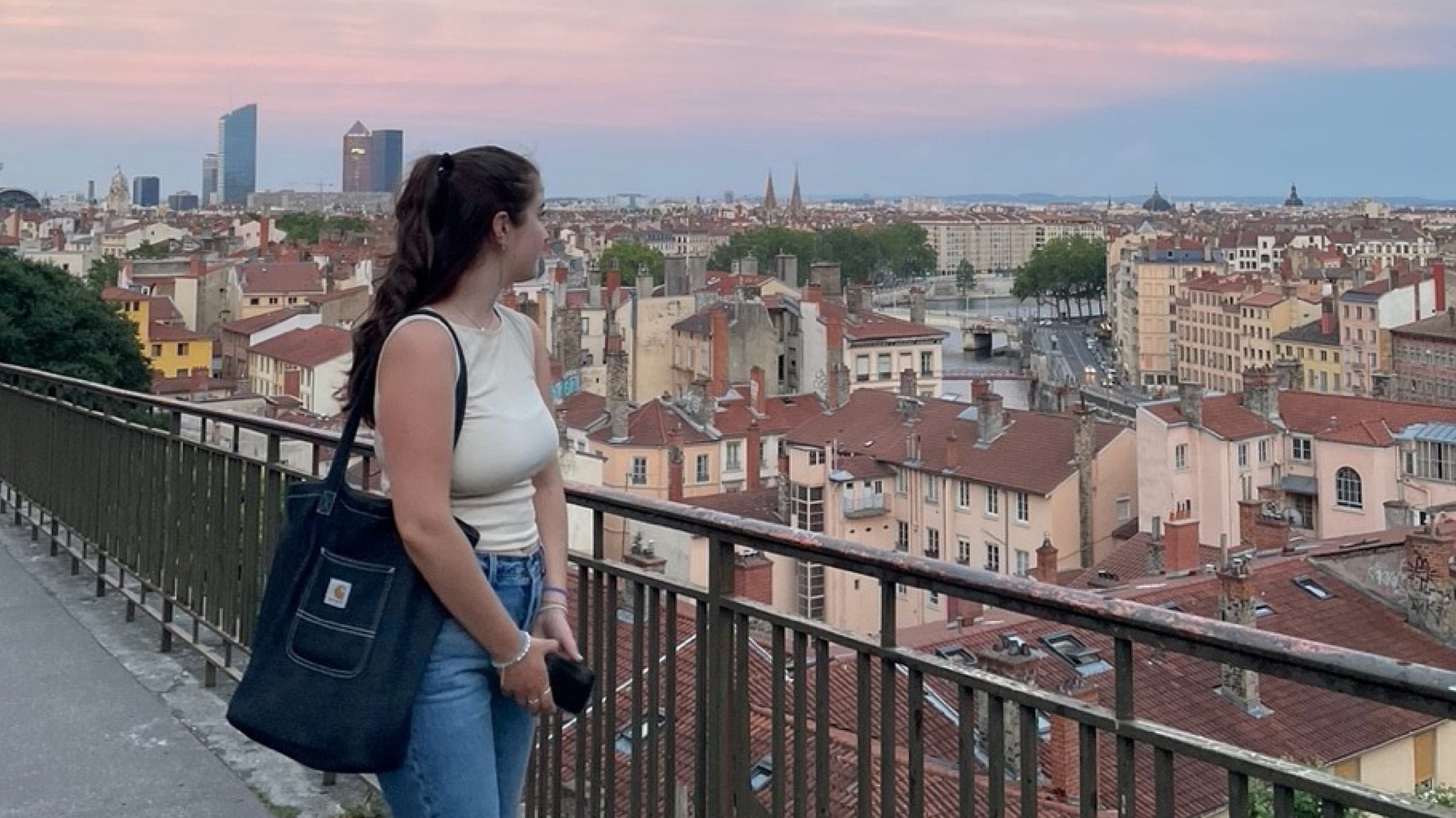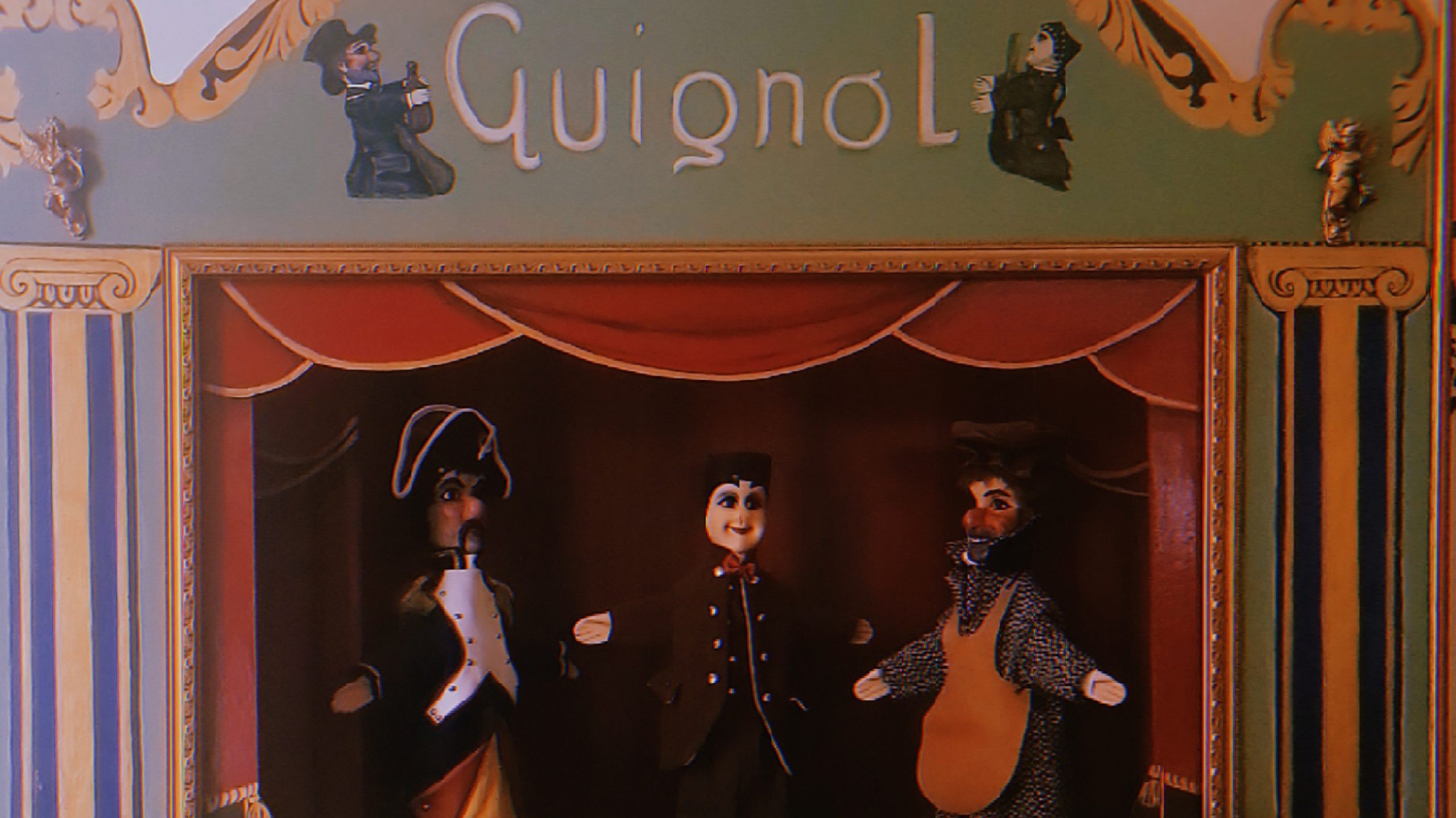UBC student of French, Victoria Valeva, shares about her experiences studying abroad in Lyon, France through a Global Seminar in Summer 2023. In the second half of this article, Dr. Caroline Lebrec describes FREN 420 in detail, where students compared the reality in Lyon to the city’s representation in fiction.


“Being able to live in a country that is so different from Canada helped broaden my ideas for my own future and how I want my life to be. It really shocked me to realize how being there felt like home.”
Part 1: Q&A with Victoria Valeva
How did studying abroad differ from the typical classroom experience?
The immersive experience is nothing like a typical classroom setting. Through this study abroad program, you are able connect with different people, a different culture, and a different lifestyle that you otherwise would not have the opportunity to be exposed to. Secondly, the ability to explore the city you are studying and reading about allows you to grasp its influence and further your knowledge. You have the freedom to explore a new society and way of living, which forms a deeper connection between you and your environment.
What activities did you do outside of classes?
Our class trips involved museums, plays, restaurants and tours. On our own time, we were able to travel to different cities, explore the nightlife, dine at different restaurants, go shopping, etc. Engaging with the locals, walking through the narrow streets, popping in and out of stores, and entering churches and cathedrals are some of the few activities I chose to partake in with friends in Lyon! You are given freedom and autonomy; you can engage in any activities that meet your heart’s desires!
What was the biggest highlight?
The ability to live in a new city was the most fulfilling part of this experience. Having the independence to make friends and go to lunch or hop on a train to visit a new city was incredible. As a young student, it is very freeing, enriching, and valuable to have this opportunity. Traveling to new cities within reach, trying new restaurants and cuisines, and living amongst other people has an immense impact on your perception of the world.
Personally, I realized that I would love to live in France one day—whether it be a short period of time or just for a summer. Being able to live in a country that is so different from Canada helped broaden my ideas for my own future and how I want my life to be. I felt happy every day that I was in Lyon. It was refreshing, new and powerful to feel so content. It really shocked me to realize how being there felt like home.
Highlight reel:
Part 2: A Deep-Dive into the Course with Dr. Caroline Lebrec
Overview
FREN 420: La représentation de Lyon dans la littérature was a unique experiential learning opportunity for a group of 11 UBC students. The 3-week intensive course that took place in Lyon, France, in Summer 2023 provided students a unique experience of learning beyond the classroom, with a 21st -century approach to teaching and learning that focuses mostly on interaction, mediation and experiencing both language and culture through immersion as ways of learning a language.
Mornings were dedicated to class time at the Université de Lyon II located on the river Rhone in the city’s centre, followed by field trips in the afternoon. The students typically spent the evenings with their host families to experience the authentic French culture of Lyon in daily life. On weekends, students had the opportunity to explore Lyon and its surroundings in Southeast France or abroad.
Modules
The course was designed with modules that focused on experiencing the reality in Lyon versus how the city is represented in fiction (novels and comics). Each module was dedicated to a specific aspect of Lyon culture: its traboules, its neighbourhoods, its gastronomy and its famous puppet Guignol. For each module, students had to read a fiction book in French and then experience the book’s content on the field through the reality of contemporary Lyon.
Gastronomy Module


For example, for the module on gastronomy, we studied a book that applies a feminist approach to Lyon’s successful lineage of Michelin star chefs by focusing on its mères lyonnaises, the women who invented Lyon’s gastronomy and who trained most of the world- famous chefs, including the legendary Paul Bocuse. Lyon is often called the gastronomic capital of the world, so to go along with the book’s content, students participated in a guided tour of the Halles Paul Bocuse where they visited the permanent exhibition dedicated to the mères lyonnaises. To wrap up the gastronomy module, students had dinner at a bouchon, a type of restaurant found only in Lyon that serves traditional local cuisine invented by the mères lyonnaises.
Guignol the Puppet Module


Another experiential learning module was designed around Lyon’s famous puppet Guignol, who represents the silk industry workers in France. Students first read the book Faire Guignol written by Paul Fournel, the French expert of Guignol, and they analyzed the book in class. In a creative workshop led by Paul Fournel himself, the students wrote their own play version of Guignol before visiting the museum of the puppet tradition (Musée des arts de la marionnette), with Paul Fournel as their own personal guide. At the museum, some students experimented with puppet manipulation and entertained the group with improv performances. A professional show by the well-known Lyon puppet artist Daniel Streble took the students behind the scenes of puppet theatre, including seeing the artist’s large collection of puppets from different centuries and cultures.
Neighbourhoods Module


We explored Lyon’s history through the city’s diverse neighbourhoods with the help of experienced local guides and, at the same time, built intercultural knowledge and skills. Each student wrote about their own experience in Lyon and the intercultural representation of the city in a blog assignment for the course (Carnet de voyage). Other course assignments took the form of an essay and a comparative approach between ‘Lyon in books’ and ‘Lyon in reality’ based on the student’s own experience of the city.
Final Remarks
Thank you to the Department of French, Hispanic and Italian Studies of UBC for encouraging this initiative to happen and to the Go Global office, especially the Go Global award that helps students cover the extra cost of taking a course abroad. I would also like to thank Paul Fournel for his dedication to pass on his cultural knowledge to the students. Last, but not least, thank you to the wonderful group of students for their passion, motivation and happiness throughout this unique course experience.
The next Go Global Seminar in Lyon will be FREN 395: La représentation de Lyon dans les médias (May 21 – June 7, 2024). An A2 level is required to participate (equivalent of FREN 202).


